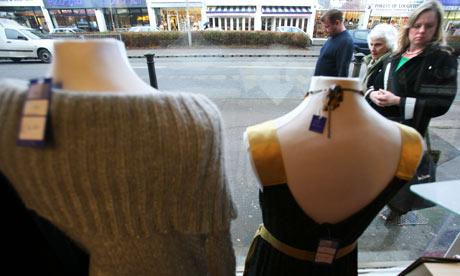A turf war has broken out between charities over the lucrative but increasingly competitive market in secondhand clothes.
The price for recycled textiles has soared over the last few years, resulting in an explosion in the number of recycling banks and door-to-door bag collections that were once the preserve of charity shops.
Charities with shops have hit out at others who they say are damaging their trade by teaming up with commercial textile merchants. One charity, Traid, has accused others of "aggressive tactics" and even theft.
Traid and the Children's Society, both of which run charity shops, and the Association of Charity Shops (ACS) say those who enter partnerships with commercial companies are selling their names too cheaply.Paul Tate, the merchandise manager of the Children's Society, said: "The largest single threat to the profit charities with shops get by door-to-door collections is by commercial textile merchants entering into partnerships with charities, many of whom do not operate shops. While there is no question of legitimacy, the 'donation' made by the textile collector to the charity is as little as £50 per tonne."
If donated to a charity shop, that same tonne would have made between £500 and £800 in net profit, according to Tate. The international price for secondhand clothes, depending on quality, is somewhere between £500 and £1,000.
Tate is concerned over what he says is an "absence of transparency" that does not allow the public to donate clothes based on the percentage of proceeds that go to the charity.
Maria Chenoweth-Casey, the chief executive of Traid, which runs shops and recycling banks, said it had lost the equivalent of £250,000 due to the "competition and lunacy" going on in the sector. She accused unnamed competitors of using aggressive tactics, including stealing Traid's banks from sites.
Chenoweth-Casey, who has contacted the police about the incidents, said: "In the last three months, we've had 15 banks along the south coast emptied regularly and the contents stolen. We put a tracker on one of the banks and it ended up in the premises of a commercial operator who works for charities, in London. Another commercial operator who works for charities took away two of our textile banks. We contacted the charity concerned and they said it was an accident."
She said: "At the end of the day, charities are allowing companies to fund-raise on their behalf and so the buck stops with them."
She said that Traid lost 512 tonnes of clothes – worth £250,000 which would go to its development projects, such as supporting child labourers in India's textile industry and helping farmers in Africa to get Fair Trade status – through a mixture of theft and losing banks on sites to other operators.
Lekha Clouda, director of the ACS, which has 300 members, said: "The reason that commercial collectors want to work with charities is that otherwise they wouldn't get stock at all.
"There are charities out there, many of whom don't have shops, who are not aware of the true value of materials collected in their name. No charity should be selling itself too cheaply."According to ACS's figures, there has been a 25% drop in the rates of return, or number of full bags handed over, from door-to-door collections in recent years. It claims part of that is down to competition from charities linked to commercial companies.
Today, the Textile Recycling Association said it did not accept the ACS's assertion that falling donations to charity shops were due to increases in door-to-door collections; instead, they were "simply down to the recession".
Alan Wheeler, of the TRA, which represents commercial textile recycling companies and charities, said: "The value of a tonne of clothing collected door to door is high, but so is the cost of collecting, storing, sorting and other associated costs. We estimate that this cost amounts to over £500 a tonne."
Wheeler said that if a charity collected door to door itself, it would make less than £100a tonne.
One of Britain's largest charities, the NSPCC, defended its decision to use ClothesAid, a commercial textile operator which only operates door to door collections, as partners for fundraising.
An NSPCC spokesman said: "Many people cannot get to a charity shop easily, due to transport or personal mobility issues, and the NSPCC does not have a retail operation through which it can sell clothes. Therefore by partnering with ClothesAid it is able to benefit from this very cost effective way of raising funds."
Michael Lomotey, of ClothesAid, declined to say how much it received for a tonne of clothes because of commercial sensitivity. However, he said: "We donate £75 per tonne to the NSPCC. Our profits are probably £6 per tonne and the rests is costs. We give between 84 and 93% to charity."






